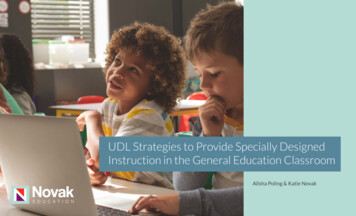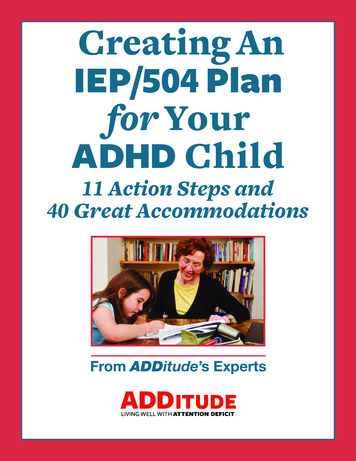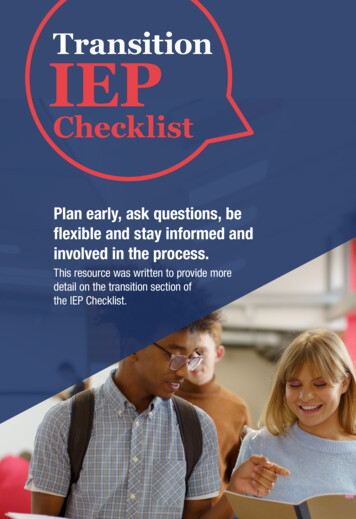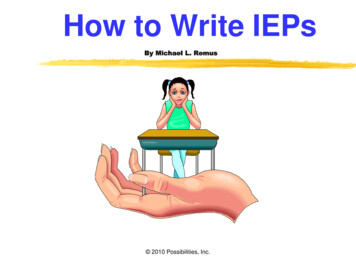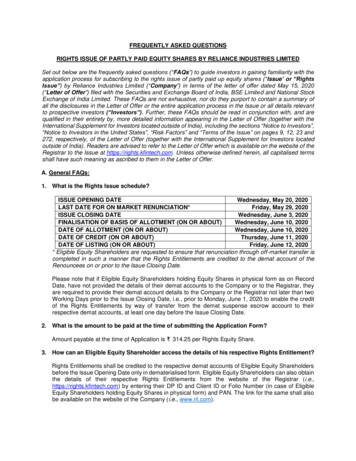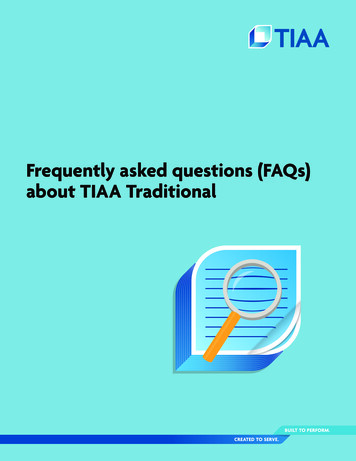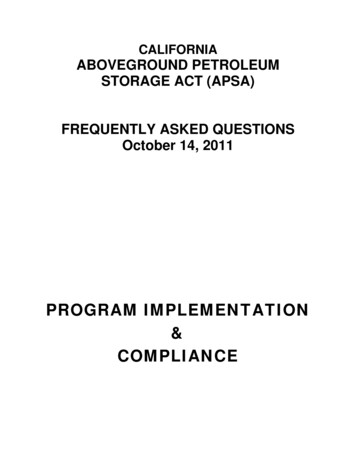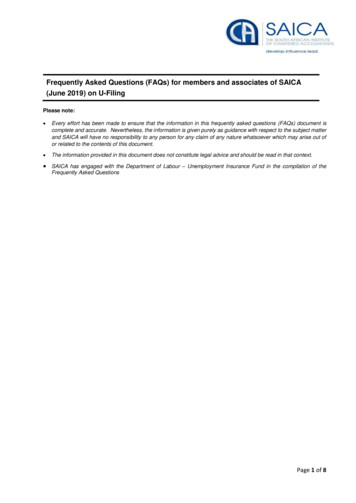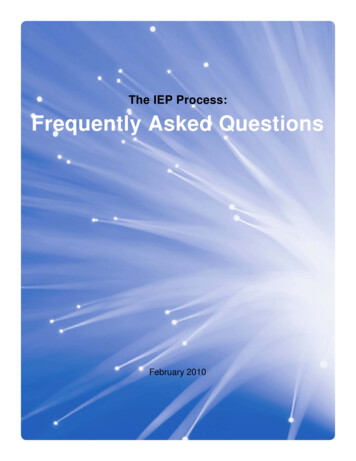
Transcription
The IEP Process:A. DEVELOPMENT OF THE IEPFrequently Asked QuestionsFebruary 2010
Developed forRhode Island Department of Elementary and Secondary EducationDeborah A. GistCommissionerRhode Island Board of Regents for Elementary and Secondary EducationRobert G. Flanders Jr. Esq., ChairmanPatrick A. Guida, Esq., Vice-ChairmanColleen Callahan, SecretaryAmy Beretta, Esq.Anna Cano-MoralesFrank Caprio, Esq.Angus M. DavisKarin ForbesBetsy P. ShimbergOffice of Student, Community and Academic SupportsKenneth G. Swanson, DirectorAuthorsBarrie Grossi, RI Technical Assistance ProjectLynne Ryan, Providence College2
Table Of ContentsA. Development of the IEP . 81. How is the IEP developed? . 82. When must the IEP be in effect? . 8IEP Team Members . 103. Who must be present at the IEP meeting? . 104. What are the roles and responsibilities of the parents of the student? . 115. What are the roles and responsibilities of the regular education teacher? . 136. What are the roles and responsibilities of the special education teacher? . 147. What are the roles and responsibilities of the representative of the publicagency? . 148. Who can fulfill the role of the individual who can interpret the instructionalimplications of evaluation results? . 159. Who else can attend the IEP meeting? . 1510. When is it required for the child with a disability to attend his/her IEP meeting? . 1511. Who must be invited to the IEP meeting, if post-school goals are to bediscussed at the IEP meeting? . 1612. How can the IEP Team ensure that parents are represented on the IEP Team? . 1713. How can districts encourage the participation of parents who represent culturallyand linguistically diverse backgrounds? . 1714. Can the IEP Team hold an IEP meeting without the parent present? . 1715. If a student with a disability has several regular education teachers, must all ofthem attend the IEP meeting? . 1816. If the student with a disability is in a substantially separate program and/or doesnot have a regular education teacher, must a regular education teacher attend? . 1917. Must a regular education teacher attend an IEP meeting for a preschool child? . 1918. If a student with a disability has need for related services, must a related serviceprovider attend the IEP meeting? . 1919. What can the IEP Team do if a parent of a child with a disability under the ageof majority (18) does not want that child to attend his or her IEP meeting andpost-school goals are going to be discussed? . 2020. Can required members of the IEP Team be excused from attending themeeting?. 2021. Can parents or LEAs bring their attorneys to IEP meetings? . 213
Evaluation Teams/IEP Teams . 2222. What is the relationship between the team of qualified professionals, known asthe Evaluation Team, who determined the child eligible for special educationservices and the IEP Team? . 2223. What happens if, after considering the referral the Evaluation Team, includingthe parent, determines that the student does not require an evaluation forspecial education? . 2724. What is the role of the parent on the Evaluation Team? . 2825. Can the Evaluation Team determine services?. 2826. Why is the information provided by the team of qualified professionals, knownas the Evaluation Team, and the parent important to the IEP Team? . 2827. Can a district combine the team meeting to determine the need for specialeducation and the IEP meeting? . 2928. What should the team consider in developing the student’s IEP? . 29B. Content of the IEP . 3129. What must be included in the IEP? . 31Transition . 3430. What is transition and how does it relate to the IEP? . 3431. Must the IEP for every 14 year old student with a disability regardless of thestudent’s skill levels, include measurable postsecondary goals relating toeducation, employment and training?. 3732. May community access skills be included in the IEP as independent livingskills? . 3833. What are age appropriate transition assessments? . 3834. If an IEP Team chooses to address transition before age 14 (for example, atage 13) are the same standards required? . 3935. Section 300.320(b)(1) requires that appropriate postsecondary transition goalsbe measurable. Must we measure goals once a student has graduated or hasaged out? . 39Present Levels of Academic Achievement and Functional Performance . 4036. What are present levels of academic achievement and functional performance? . 4037. If a student does not have needs in the area of functional performance must astatement be included on the IEP? . 4238. Can a student with a disability have a Personal Literacy Plan (PLP)? . 4339. How does the Personal Literacy Plan (PLP) and the Individual Learning Plan(ILP) connect to the IEP? . 444
40. Does each area of need identified in the IEP Present Levels need to have anannual goal? . 4441. In developing present levels of academic achievement and functionalperformance for children aged 3-5 what standards would be used? . 4542. Must all eight (8) areas of the Early Learning Standards be addressed in thePresent Level? . 45Measurable Annual Goals. 4643. How does the “Baseline” on the annual goals page differ from the PresentLevels of Academic Achievement and Functional Performance? . 4644. How are the student’s annual goals in each area of need developed? . 4745. What standards are used for functional goals? . 4746. If a student is performing well below grade level, such as a 9th grader readingat a 2nd grade level, which GLEs would the IEP Team use? . 4847. If a preschool child will turn 5 during the timeframe of the IEP and enterkindergarten, which standards should be used when writing the goalstatements? . 4848. What are short term objectives or benchmarks? . 4849. What is included in the section of the IEP addressing how the child’s progresstoward meeting the annual goals will be measured? . 4950. How often must school districts provide reports to families on the child’sprogress towards IEP goals? . 49Special Education and Related Services and Supplementary Aids and Services . 5151. What is included in the statement of special education and related services andsupplementary aids and services? . 5152. What is meant by the term special education? . 5153. If the child with a disability is provided a specialized reading program by thereading teacher can the reading teacher be listed on the IEP as the provider?. 5354. If the individual who fills the role as the reading teacher in a particular building isalso certified in special education, can s/he fulfill the role of special educator inproviding the special education services to the child with a disability as definedon the child’s IEP? . 5455. What are related services? . 5456. Must a school district provide related services that are required to assist a childwith a disability to benefit from special education, if those services are notincluded in the list of related services in the regulations? . 5757. What are supplementary aids and services? . 585
58. What is meant by peer reviewed research in the statement of special educationand related services and supplementary aids and services? . 5859. What can the IEP Team do if there is no peer-reviewed research available on aparticular special education service, related service or supplementary aid andservice? . 5960. Can a particular program or methodology be specified in the IEP? . 6061. What is assistive technology? . 6062. Would assistive technology be considered a supplementary aid and service? . 6163. Must assistive technology (AT) be considered for each child with a disability? . 6164. What are supports to school personnel? . 6265. Can a reading specialist be listed under supports to school personnel?. 6266. What are program modifications? . 62Service Delivery . 6367. Must the frequency and duration of services be specified in the IEP? . 6368. If a child is in a co-taught general education classroom and the specialeducation teacher is there for 90 minutes how much time would the IEP Teamrecord under frequency for that goal? . 6369. If a child at the high school level is in co-taught classes for the entire day howwould the amount of time be captured on the IEP? . 6470. Where would a teacher assistant be listed on the IEP? . 6571. If a child with a disability is in general education classes 100% of the time andhas a fulltime teacher assistant who is monitored by the special educationteacher, how would that be listed in the special education section of the IEP? . 6572. Where would a physical therapist assistant or an occupational therapistassistant be listed on the IEP? . 6673. How is case management listed in the IEP? . 6674. If a child is in an inclusion class for some of the time, but may be pulled out formore intensive instruction some of the time, how would that be listed on theIEP? . 6775. How can a team ensure that the student with a disability receives services in theleast restrictive environment? . 6776. For children placed in special classes within a juvenile correctional facility,which box should be checked for placement of this student? . 6977. If a child enters Kindergarten at 5 years of age and an annual IEP is developed,does the IEP Team use the 3-5 (left side of placement box) or does it use the6 (right side of the placement box)? . 6978. If a secondary child is in the high school in the morning and is involved withservices provided by an outside agency in the afternoon, how would that be6
described on the IEP?. 69C. Other . 7079. Can students with disabilities be exempted from state and district assessments? . 7080. Must Parents sign the IEP? . 7081. What is an interim IEP? . 71D. Review and REvision . 7282. Can an existing IEP be amended? . 7283. What happens at the time of the annual review and revision? . 737
A. DEVELOPMENT OF THE IEPA. DEVELOPMENT OF THE IEP1.How is the IEP developed?Once a student has been designated as a student with adisability and is eligible for special education and relatedFor a professionalservices under IDEA 2004, the school district must conduct adevelopment module on IEPmeeting to develop an Individualized Education Programmeetings go to Module 14:(IEP). This meeting must occur within 15 school days ofMeetings of the IEP Team atdetermining that the student needs special education andhttp://www.nichcy.org/Lawrelated services.s/IDEA/Pages/module14.aspx2.When must the IEP be in effect?According to RI Board of Regents for Elementary and Secondary Education RegulationsGoverning the Education of Children with Disabilities the IEP must be in effect as soon aspossible following development of the IEP, but no later than 10 school days. As soon as theIEP is developed the school district will provide the parents of the child with written notice ofthe action it will take. Within a reasonable time, which is defined in RI as ten school days,the IEP will be implemented.§300.323(c)(a) General. At the beginning of each school year, each public agency must have ineffect, for each child with a disability within its jurisdiction, an IEP as defined in§300.320.(c)Initial IEPs; provision of services. Each public agency must ensure that:(1) A meeting to develop an IEP for a child is conducted within 15 school days of a8
determination that the child needs special education and related services; and(2) As soon as possible following development of the IEP, but not later than ten (10)school days, special education and related services are made available to the child inaccordance with the child’s IEP.§300.503 Prior notice by the public agency; content of notice(a) Notice. Written notice that meets the requirements of paragraph (b) of thissection must be given to the parents of a child with a disability within a reasonabletime (ten school days) before the public agency —(1) Proposes to initiate or change the identification, evaluation or educationalplacement of the child or the provision of FAPE to the child; or(2) Refuses to initiate or change the identification, evaluation, or educationalplacement of the child or the provision of FAPE to the child.(b) Content of notice. The notice required under paragraph (a) of this section mustinclude —(1) A description of the action proposed or refused by the agency;(2) An explanation of why the agency proposes or refuses to take the action;(3) A description of each evaluation procedure, assessment, record or report theagency used as a basis for the proposed or refused action;(4) A statement that the parents of a child with a disability have a protection underthe procedural safeguards of this part and, if this notice is not an initial referral forevaluation, the means by which a copy of the description of the proceduralsafeguards can be obtained;(5) Sources for parents to contact to obtain assistance in understanding theprovisions of this part;(6) A description of other options that the IEP Team considered and the reasons whythose options were rejected; and(7) A description of other factors that are relevant to the agency’s proposal or refusal.(c) Notice in understandable language.(1) The notice required under paragraph (a) of this section must be —A. DEVELOPMENT OF THE IEP(i) Written in language understandable to the general public; and(ii) Provided in the native language of the parent or other mode of communicationused by the parent, unless it is clearly not feasible to do so.(2) If the native language or other mode of communication of the parent is not awritten language, the public agency must take steps to ensure —(i) That the notice is translated orally or by other means to the parent in his or hernative language or other mode of communication;(ii) That the parent understands the content of the notice; and(iii) That there is written evidence that the requirements in paragraph (c)(2)(i) and(ii) of this section have been met.9
IEP Team Members3.Who must be present at the IEP meeting?The individuals who must be present at the meeting todevelop the student’s IEP are:For a professionaldevelopment module on1. The parent(s) of the student;2. Not less than one of the student’s regular educationteachers (if the child is, or may be participating in theregular education environment);The IEP Team go to Module12 spx3. Not less than one of the student’s special educationteachers, or where appropriate not less than one special education provider of the childIEP TEAM MEMBERS4. A representative of the public agency (i.e., school district)5. An individual who can interpret the implications of evaluation results (may be also fillingthe role of 2, 3, or 4)6. Other individuals who have knowledge or special expertise regarding the student (at thediscretion of the parent or school district). This includes related service providers asappropriate. An individual with knowledge of second language acquisition, includingEnglish Language Proficiency Standards and Assessments must be invited if thestudent is an English Language Learner.7. The student must be invited if the purpose of the meeting is to discuss transitionservices and needs.10
300.321 IEP Team.(a) General. The public agency must ensure that the IEP Team for each child with adisability includes —(1) The parents of the child;(2) Not less than one regular education teacher of the child (if the child is, or may be,participating in the regular education environment);(3) Not less than one special education teacher of the child, or if appropriate, not lessthan one special education provider of the child;(4) A representative of the public agency who —(i) Is qualified to provide, or supervise the provision of, specially designed instructionto meet the unique needs of children with disabilities;(ii) Is knowledgeable about the general education curriculum; and(iii) Is knowledgeable about the availability of resources of the public agency and hasthe authority to commit those resources;(5) An individual who can interpret the instructional implications of evaluationresults, who may be a member of the team described in paragraphs (a)(2) through(a)(6) of this section;(6) At the discretion of the parent or the agency, other individuals who haveknowledge or special expertise regarding the child, including related servicespersonnel as appropriate; and(7) Whenever appropriate, the child with a disability.(b) Transition services participants.(1) In accordance with paragraph (a)(7) of this section, the public agency must invitea child with a disability to attend the child’s IEP Team meeting if a purpose of themeeting will be the consideration of the postsecondary goals for the child and thetransition services needed to assist the child in reaching those goals under§300.320(b).(2) If the student does not attend the IEP Team meeting, the public agency must takeother steps to ensure that the student’s preferences and interests are considered.IEP TEAM MEMBERS(3) To the extent appropriate, with the consent of the parents or a child who hasreached the age of majority, in implementing the requirements of paragraph (b)(1) ofthis section, the public agency must invite a representative of any participatingagency that is likely to be responsible for providing or paying for transition services.4.What are the roles and responsibilities of the parents of the student?The parents of a child with a disability are expected to beinFor more information on usingdeveloping, reviewing, and revising the IEP for their child.interpreters, refer to the RIDEThis is an active role in which the parents provide criticalbrochure Holding Meetingsinformation regarding the strengths and needs of their childRelated to Special Educationand express their concerns and suggestions for enhancingwith Interpreters andthe education of their child. Though parents are expected toCulturally and Linguisticallybe equal partners at the IEP meeting, writing IEPs orDiverse Families andparticipating at IEP meetings is a new experience for manyStudents available nelwithparentsIDE-brochure.pdf11
throughout the evaluation process and prior to IEP notification, regarding what will bediscussed at the meeting, questions to consider, Transition Questionnaires etc. This wouldenhance parents’ readiness to share their wishes (i.e., goals) for their child, as well as tocontribute to the determination of the child’s needs and present levels of performance.Please remember that all information sent to parents must be in their native language.Districts must arrange for interpreters for parents when necessary.300.322 Parent participation.(a) Public agency responsibility — general. Each public agency must take steps toensure that one or both of the parents of a child with a disability are present at eachIEP Team meeting or are afforded the opportunity to participate, including —(1) Notifying parents of the meeting ten (10) school days prior to the meeting toensure that they will have an opportunity to attend (the parent may agree to waivethe ten (10) day notice requirement in order to expedite the IEP Team meeting); and(2) Scheduling the meeting at a mutually agreed on time and place.(b) Information provided to parents.(1) The notice required under paragraph (a)(1) of this section must —(i) Indicate the purpose, time, and location of the meeting and who will be inattendance; and(ii) Inform the parents of the provisions in §300.321(a)(6) and (c) (relating to theparticipation of other individuals on the IEP Team who have knowledge or specialexpertise about the child), and §300.321(f)(relating to the participation of the Part Cservice coordinator or other representatives of the Part C system at the initial IEPTeam meeting for a child previously served under part C of the Act).(2) For a child with a disability beginning at age 14, or younger, if deemedappropriate by the IEP Team, the notice must (i) Indicate —(A) That a purpose of the meeting will be the consideration of postsecondary goalsand transition services for the child, in accordance with §300.320(b); and(B) That the agency will invite the student; and(ii) Identify any other agency that will be invited to send a representativeIEP TEAM MEMBERS(c) Other methods to ensure parent participation. If neither parent can attend anIEP Team meeting, the public agency must use other methods to ensure parentparticipation, including individual or conference telephone calls, consistent with§300.328 (related to alternative means of parent participation).(d) Conducting an IEP meeting without a parent in attendance. A meeting may beconducted without a parent in attendance if the public agency is unable to convincethe parents that they should attend. In this case the public agency must have a recordof its attempts to arrange a mutually agreed on time and place, such as(1) Detailed records of telephone calls made or attempted and the results of thosecalls;(2) Copies of correspondence sent to the parents and any responses received; and(3) Detailed records of visits made to the parent’s home or place of employment andthe results of those visits.(e) Use of interpreters or other action, as appropriate. The public agency must takewhatever action is necessary to ensure that the parent understands the proceedingsat the IEP Team meeting, including arranging for an interpreter for parents withdeafness or whose native language is other than English.(f) Parent copy of child’s IEP. The public agency must give the parent a copy of the12
child’s IEP at no cost to the parent and not later than ten (10) calendar days after —(1) An IEP has been developed for the child; and(2) After the receipt of a request for a copy of the IEP.5.What are the roles and responsibilities of the regular educationteacher?The regular education teacher of the child with a disability has a very important role at IEPTeam meetings. The teacher brings the knowledge of the general education curriculum thatis necessary for the IEP Team to create an individualized program for the child thatemphasizes access to and progress in the general education curriculum. This knowledgeincludes information on academic and behavioral expectations for the child’s ageappropriate grade level, data on the child’s performance on state/district assessments,classroom data, information on positive behavioral interventions and supports, andcurriculum methods and materials and how they might be adapted when needed to meetthe individual needs of the child with a disability. Finally, the regular education teachershave familiarity with the assessments that are used in the general curriculum that could beused to determine the student’s present levels of academic achievement or functionalperformance as well as to monitor the student’s progress.The importance of the regular education teacher attending the IEP meeting was reinforcedin the Federal Register, Monday, August 14, 2006 which stated:.a regular education teacher is a required member of an IEP Team if the child is, ormay be, participating in the regular education environment. In such cases the regulareducation teacher would be expected to attend each IEP Team meeting, unless theregular education teacher has been excused from attending a meeting pursuant to§300.321(e) and §614(d)(1)(C) of the Act. (p. 46669)300.324 Development, review, and revision of IEPIEP TEAM MEMBERS(a) Development of IEP — .(3) Requirement with respect to the regular education teacher. A regular educationteacher of a child with a disability, as a member of the IEP Team, must, to the extentappropriate, participate in the development of the IEP of the child, including thedetermination of —(i) Appropriate positive behavioral interventions and supports and other strategiesfor the child; and(ii) Supplementary aids and services, program modifications and supports for schoolpersonnel consistent with §300.320(a)(4).13
6.What are the roles and responsibilities of the special educationt
the action it will take. Within a reasonable time, which is defined in RI as ten school days, the IEP will be implemented. §300.323(c) (a) General. At the beginning of each school year, each public agency must have in effect, for each child with a disability within its jurisdiction, an IEP as defined in §300.320.(c)


